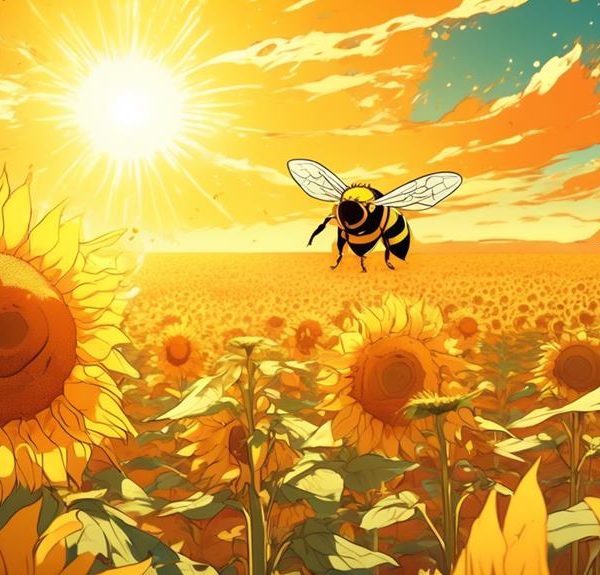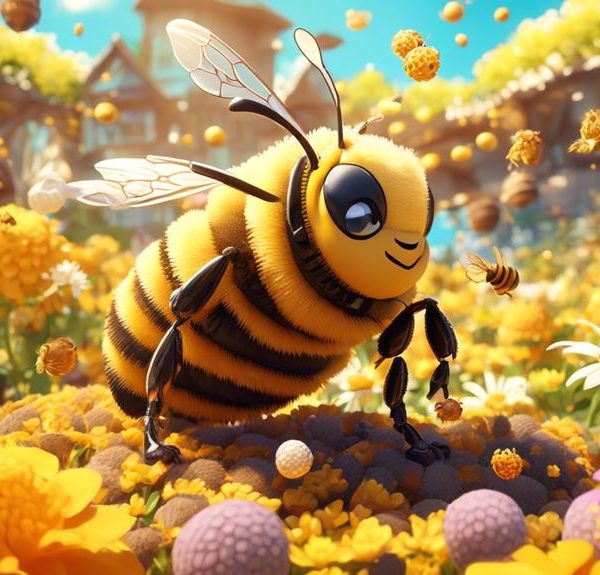Investigate the intriguing interaction between bees and lavender oil, a vital exploration for bee conservation and our ecosystem.
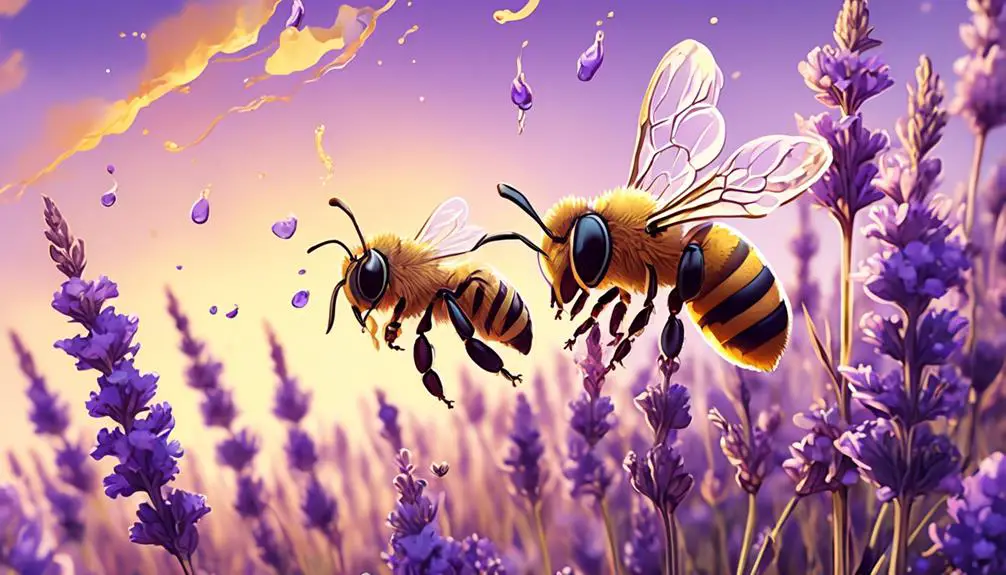
Do Bees Like Lavender Oil?
Drawing upon Aesop's fable of the industrious bee, you might be curious to know if bees, renowned for their attraction to diverse floral scents, show any preference for lavender oil. It's a subject that's not only intriguing but also potentially significant for bee conservation efforts and our broader ecosystem.
So, do bees gravitate towards lavender oil, or do they tend to shy away from it? As we venture further into this topic, you'll discover how this seemingly simple question can unfold into a fascinating exploration of bee behavior and the enticing world of essential oils.
Key Takeaways
- Bees are naturally attracted to the scent and color of lavender oil.
- Lavender oil can be used to attract honeybees and potentially enhance bee conservation efforts.
- High concentrations of lavender oil can repel bees, so moderation is key.
- Over-reliance on lavender oil could disrupt natural foraging patterns and lead to nutritional imbalances in bees.
Understanding Bee Behavior
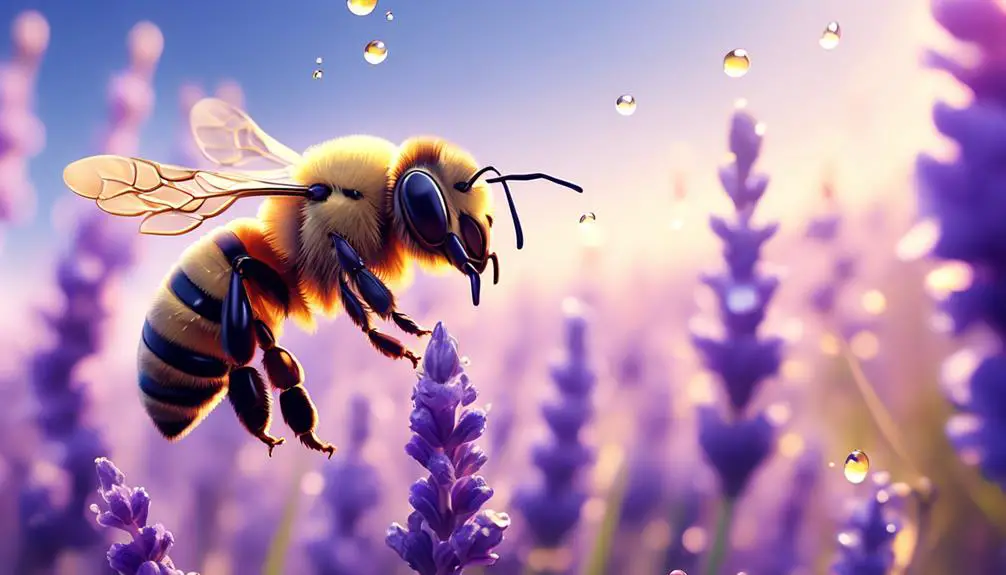
To fully grasp why bees may or may not be attracted to lavender oil, it's crucial to comprehend their behavior and the underlying biological mechanisms that drive their actions.
You see, bees aren't just simple insects. They're complex creatures with a sophisticated foraging strategy guided by an intricate olfactory system.
Bees use their antennas to detect and identify scents from afar, seeking out the most potent sources of nectar. They're drawn to strong, sweet fragrances like those emitted by lavender oil. However, it's not just the aroma that attracts them. Bees also rely on visual cues. They're particularly attracted to brightly colored flowers, and lavender's vivid purple hue is a definite standout.
Bees' attraction to lavender oil could also be attributed to their preference for high nectar-producing plants. Lavender is known for its high nectar yield, making it a bees' paradise. But it's also essential to note that bees' behavior may vary depending on their species, local environment, and the availability of resources.
Understanding this complex interplay of scent, color, and nectar availability gives you a deeper insight into why bees might find lavender oil appealing. It's a multifaceted relationship that requires a delicate balance.
Lavender Oil: A Brief Overview
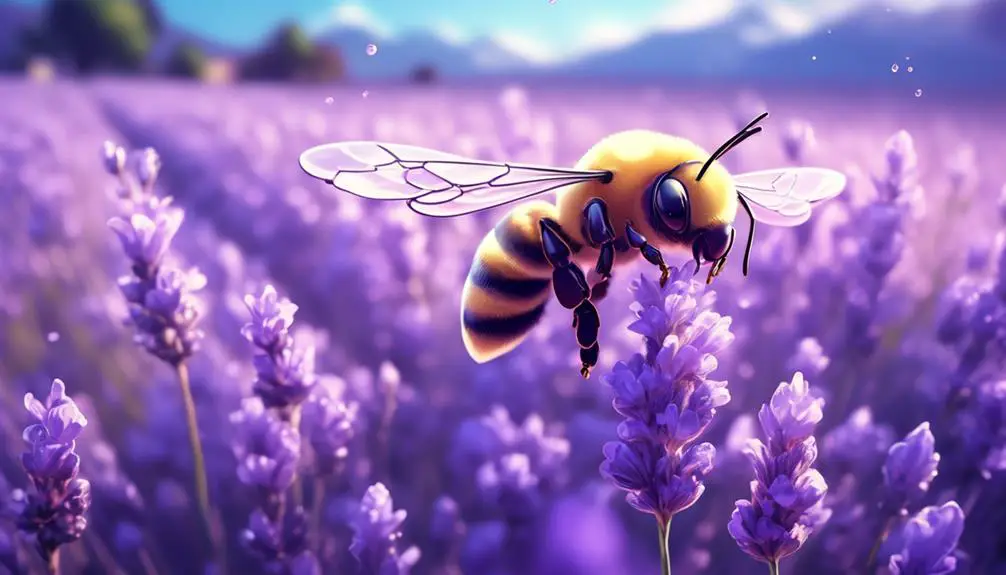
Lavender oil, nature's aromatic elixir, has a rich history and a multitude of therapeutic uses, but its allure to bees is particularly noteworthy. It's distilled from the flowers of the Lavandula angustifolia plant, a perennial shrub native to the Mediterranean region. Its scent is sweet, floral, and slightly herbaceous.
Chemically, lavender oil is complex. It's comprised of over 100 constituents, but the primary ones are linalool and linalyl acetate, which account for its distinctive aroma and therapeutic properties. These compounds are known to have calming and anti-inflammatory effects in humans. They're also what make lavender oil attractive to bees.
You see, bees are guided by their sense of smell, and the scent of lavender oil is irresistible to them. It mimics the nectar they seek, drawing them in. However, it's not just the smell that attracts them. Lavender oil also has a color that's visible to bees. Its violet hues fall within the spectrum that bees can see, making it visually enticing as well.
Bees and Essential Oils: The Connection
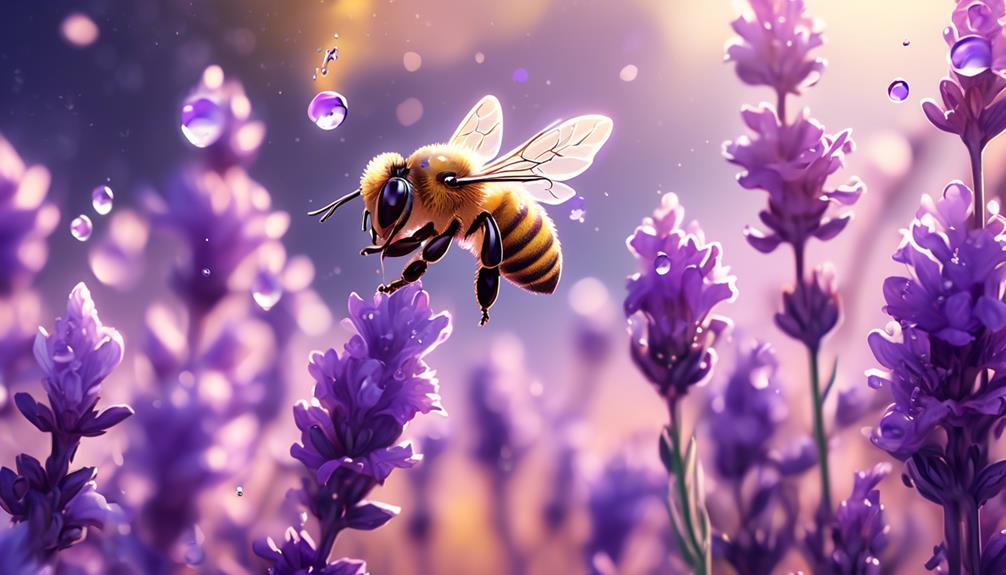
Interestingly, bees have a natural affinity for certain essential oils, including lavender, thanks to their keen sense of smell and sight. You see, bees are equipped with an extraordinary olfactory system, capable of distinguishing different scents with remarkable precision. This sense of smell is primarily used for locating flowers, which are their main source of nectar.
Essential oils, especially those derived from flowers like lavender, mimic the scents that attract bees. This is why you'll often find bees buzzing around lavender plants. The aromatic compounds released by the essential oils are similar to those found in real flowers, fooling the bees into thinking they've found a rich source of nectar.
But it's not just the scent; bees are also attracted to the color of lavender. Bees have an enhanced ability to see purple, blue, and violet hues—colors that are abundant in lavender plants. When the bees see the lavender oil or plant, they're drawn in, thinking it's a source of food.
In essence, it's a sensory deception, a trick of nature. The bees' natural instincts are exploited by the essential oils, creating an irresistible attraction that they can't ignore.
Attraction Factors for Bees
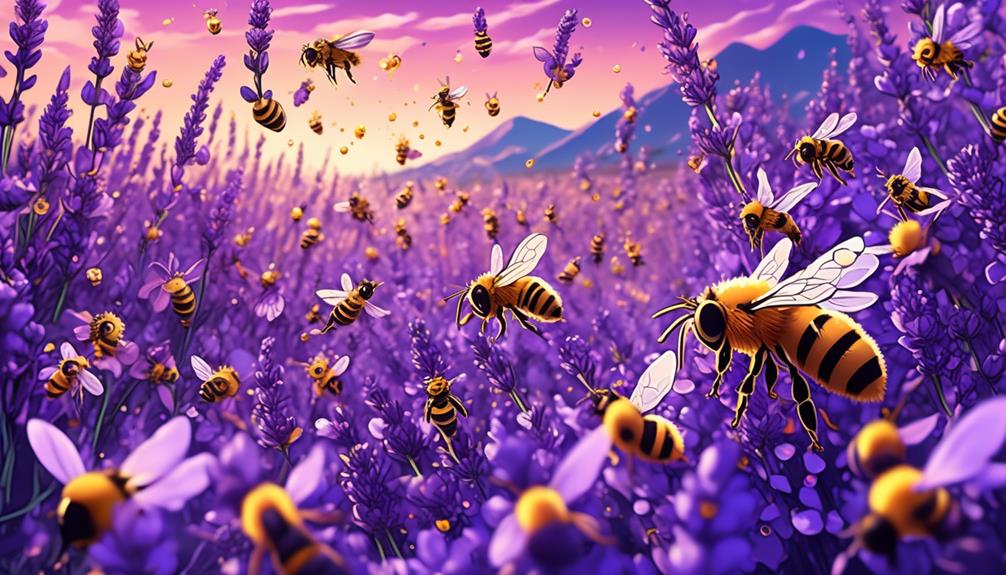
In understanding a bee's allure to certain scents and colors, it's crucial to delve into their unique sensory mechanisms and natural instincts. For instance, bees are naturally drawn to bright, vibrant colors, especially those in the blue to violet range. Their compound eyes are uniquely adapted to perceive these colors, even in ultraviolet spectrum.
Likewise, a bee's antennae serve as impressive olfactory sensors, capable of detecting a multitude of odors. They're particularly sensitive to floral volatiles, a group of scents emitted by flowers. When lavender oil, for instance, is dispersed into the air, the aromatic compounds can stimulate a bee's antennae, thus attracting them.
However, it's not just about the color or scent. The shape and pattern of a flower also play a significant role. Bees are adept at recognizing intricate patterns, like those found on the petals of a lavender bloom.
Additionally, the flower's nectar content is a strong attraction factor. Bees need nectar for energy and pollen for protein, making flowers rich in both these substances irresistible to them.
Bees' Reaction to Lavender Oil
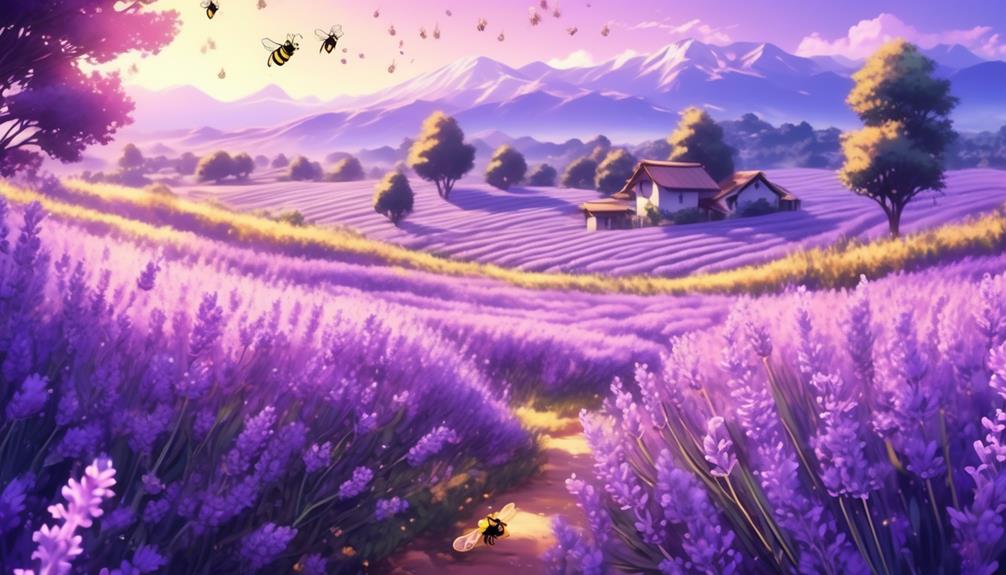
Drawing from their natural attraction to the scents emitted by flowers, let's now consider how bees react specifically to lavender oil. Lavender oil, with its potent yet pleasant aroma, often attracts bees. However, the intensity of their reaction depends on several factors.
Here's a table to provide a clearer understanding:
Factor | Effect on Bees | Remarks |
|---|---|---|
Concentration of Lavender Oil | High concentrations can deter bees. | Use in moderation to attract bees. |
Type of Bees | Different bee species react differently. | Honeybees are particularly attracted to lavender. |
Time of Day | Bees are more attracted during daytime. | Bees have better scent detection in daylight. |
You see, bees' reactions to lavender oil aren't uniform. High concentrations can repel bees, while moderate levels can attract them, particularly honeybees. The time of day also influences their attraction, with daytime being more effective due to bees' enhanced scent detection. So, if you're planning to use lavender oil to attract bees, be sure to consider these factors. Done right, lavender oil can indeed be a powerful bee attractant.
Implications for Bee Conservation
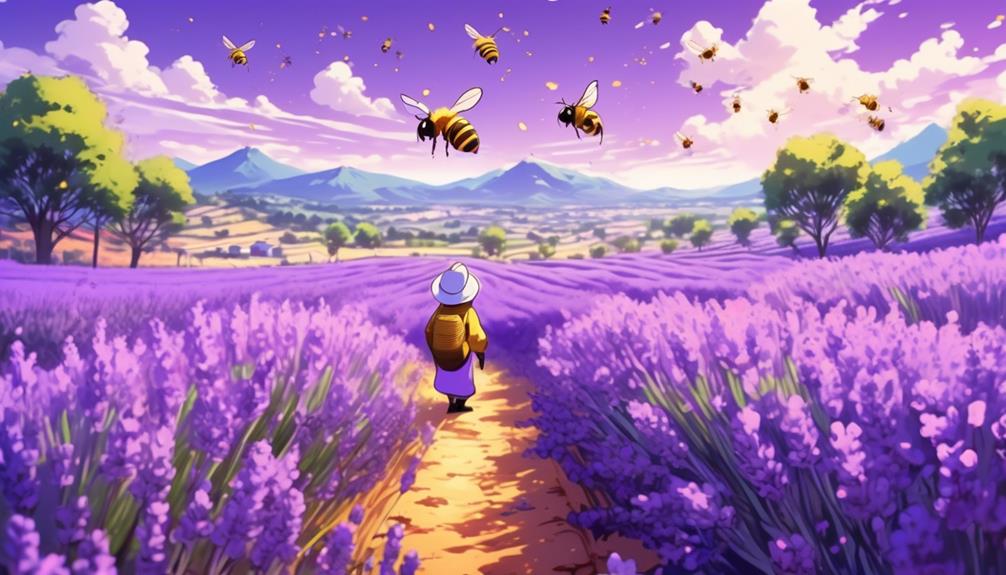
Harnessing the power of lavender oil could play a significant role in bee conservation efforts. As you consider this, remember that bees are a vital part of our ecosystem, affecting food production and biodiversity. Their decline, caused by factors like habitat loss, pesticides, and disease, has serious implications.
Now, you're probably wondering, how does lavender oil fit into this? Recent studies suggest that bees are highly attracted to lavender. Its oil, when diffused, could potentially be used to lure bees towards healthier habitats or away from areas with harmful pesticides.
But it's not as simple as you might think. You have to be careful not to create a dependency or disrupt natural foraging patterns. Over-reliance on lavender oil could lead to nutritional imbalances if bees neglect other flowers. Plus, there's a need to ensure that lavender crops aren't treated with harmful pesticides themselves.
Frequently Asked Questions
What Other Essential Oils Are Known to Attract Bees?"
You're curious about essential oils that attract bees, aren't you?
Besides lavender, bees are also drawn to scents like lemon balm, hyssop, and spearmint. They can't resist the sweet, appealing smells.
Remember though, it's important to use the oils sparingly, as too much can overwhelm and deter them.
Experiment with different types and find what works best for your local bee population.
Attracting bees can help your garden thrive!
Can Lavender Oil Be Harmful to Bees in Any Way?"
While you may think that using lavender oil could harm bees, there's no concrete evidence to support this concern.
It's true that bees are attracted to lavender's natural scent, and the oil replicates this. However, it's essential to use it sparingly and responsibly, as high concentrations could potentially be overwhelming or harmful to them.
How Can I Use Lavender Oil to Attract Bees to My Garden?"
Sure, you can use lavender oil to attract bees to your garden. Mix a few drops of the oil with water in a spray bottle. Then, lightly mist your plants and flowers.
Be careful not to overdo it, as too strong a scent can deter bees. Always test a small area first to see how the bees react.
Does the Quality or Purity of Lavender Oil Affect Its Attractiveness to Bees?"
Yes, the quality and purity of lavender oil does impact its attractiveness to bees. Pure, high-quality oil is more potent and therefore more appealing to bees. If it's diluted or mixed with other scents, it's less effective.
Is There Any Significant Difference in the Reaction of Different Species of Bees to Lavender Oil?"
You're inquiring about the varied reactions of different bee species to lavender oil.
It's crucial to note that species-specific behaviors may indeed cause different responses. For instance, honey bees might be more attracted to the scent than bumblebees.
However, more research is needed to fully understand these differences. Remember, factors such as oil quality, concentration, and other environmental aspects can also influence their reaction.
Conclusion
So, you've discovered bees' fascinating relationship with lavender oil.
While they're typically drawn to the plant's vibrant flowers, the essential oil doesn't quite have the same appeal. Contrary to popular belief, bees aren't attracted to lavender oil, largely due to its concentrated nature.
This can offer intriguing implications for bee conservation, potentially allowing us to manipulate their movement.
It's a reminder of the intricate, complex relationships in nature and our continuous learning about them.

